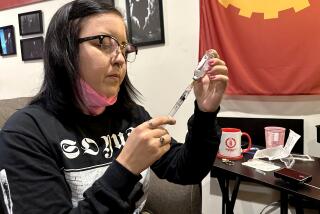Keeping tabs on patient and costs low
Not all sick patients are expensive.
At 82, Bettie Lowden is about as chronically ill as they come. Besides heart failure, she has diabetes and a history of heart attacks and strokes.
Yet Medicare spends less than $1,000 a month on her care, or about half the agency’s outlay for the average congestive heart failure patient for hospitalizations alone.
Lowden belongs to Cerritos-based CareMore Health Plan Inc., a private Medicare Advantage contractor. Medicare pays CareMore a set monthly fee of $700 to $950 per patient. In turn, CareMore cares for 34,000 Southern Californians through an HMO-style network of physicians, clinics and hospitals.
CareMore closely manages treatment in an effort to prevent patients from “bouncing around from specialist to specialist and physician to physician, test to test,” Chief Executive Leeba Lessin said. “When a patient goes into the hospital, we consider it a failure.”
A new study found that some Medicare Advantage plans, such as CareMore, which practice what is known as coordinated care, are good at keeping members out of hospitals. Their patients are readmitted 27% less often than those on traditional Medicare, the Johns Hopkins University study said.
That helps hold down spending because hospital stays are the most expensive component of medical care.
So how does coordinated care work?
For Lowden, the widow of a World War II veteran, it begins before dawn in the Orange County home she shares with her dog, Suki Wookie, a cat named Sparkles and a cockatiel that whistles “The Star-Spangled Banner” when the American flag out front waves in the breeze.
After she lets Suki out, Lowden steps on a scale that has become her lifeline. The high-tech scale transmits her weight to the Anaheim office of nurse practitioner Reginald Casilang. A gain of 3 pounds could signal a dangerous fluid buildup and will trigger a call.
“We ask them how they are doing, what their condition is, are they symptomatic, are they short of breath or having leg swelling or were they unable to sleep,” said Casilang, who manages the daily monitoring.
Casilang and his team listen not just to patients’ answers but to how they sound. If someone is out of breath, that’s another sign of fluid buildup.
“It’s like having a private duty nurse checking on me if things go wrong,” Lowden said. “They watch me like a hawk.”
If Casilang hears trouble, he gets Lowden in for a checkup that day. A physician or nurse practitioner makes sure she is sticking to her low-salt diet and taking her medications. If needed, dosages are adjusted.
Often, that’s all it takes to avoid a trip to the emergency room. By helping CareMore keep tabs on people whose conditions can easily spiral out of control, the scales have reduced hospitalizations among its congestive heart failure patients by 60%, Casilang said.
The Medicare Advantage program has been criticized because the private plans, on average, cost the government 14% more than traditional Medicare. But a few, including CareMore, beat traditional Medicare in both cost and benefits. In fact, for 86% of the cost of traditional Medicare, CareMore offers premium-free care to most of its members with rich extra benefits, including vision and dental care.
President Obama often talks about increasing value in healthcare, and experts have pointed to CareMore as a model. It is cited in the September-October edition of Health Affairs, a prestigious policy journal, as one of four “American Medical Home Runs,” organizations that provide quality care for less than their peers.
Lowden just hopes the coordinated care she receives will help her keep a promise she made her dying mother: “I’m going to live to 100.”
--
More to Read
Inside the business of entertainment
The Wide Shot brings you news, analysis and insights on everything from streaming wars to production — and what it all means for the future.
You may occasionally receive promotional content from the Los Angeles Times.









